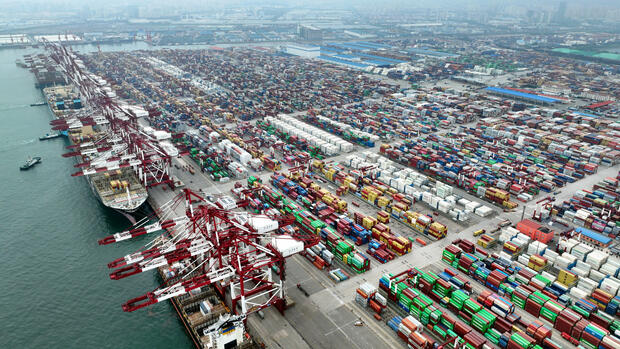Economic data from China was worse than expected.
(Photo: dpa)
Beijing The mood in the Chinese economy continued to deteriorate in May. This is shown by the official Purchasing Managers’ Indices (PMI) published by China’s national statistics agency on Wednesday. The first economic indicators for May were worse than expected. This indicates that the world’s second-largest economy is recovering from last year’s corona chaos much more slowly than many had hoped.
The industrial PMI fell to 48.8 points from 49.2 in April, the weakest reading in five months. Values below 50 for the important economic barometer indicate a downturn. Analysts had expected a slight improvement in advance.
The recovery in the service sector is also likely to slow down. The PMI for the sector fell to 54.5 from 56.4 in April. This is remarkable in that May, with the public holidays surrounding Labor Day, is one of the three most important travel and vacation times of the year.
As early as April, the purchasing managers’ indices and other economic indicators indicated that the tentative upswing after the end of the corona pandemic would not last in many areas. Investment banks such as Nomura and Barclays have therefore already lowered their forecasts for Chinese GDP growth in 2023.
German companies in China are also more pessimistic about their situation than last autumn, according to a survey by the German Chamber of Industry and Commerce (DIHK) published in early May. Several companies surveyed by Handelsblatt report that their customers are reluctant to invest in view of the economic and geopolitical uncertainty. The profits of the large industrial groups collapsed in April by almost a fifth compared to the previous year.
The reluctance of companies to invest is slowing down the recovery of the Chinese economy, as is the more cautious demand from foreign customers for products “Made in China”. The ongoing crisis in the important real estate market is also slowing down the upswing. So far, demand from Chinese consumers in particular is still supporting the economy. However, the latest purchasing managers’ data suggests that they too are becoming more cautious.
Demands for government support are getting louder
This puts increasing pressure on the state leadership to continue supporting the economy. So far, it has primarily relied on the tried and tested recipe for infrastructure investments. However, experts warn that these would no longer have the desired multiplier effect and thus boost the economy. China already has a well-developed network of high-speed trains and airports. Additional investments in these areas would therefore hardly bring any additional economic benefits.
According to official figures, China’s economy grew by 4.5 percent in the first three months. For the year as a whole, the government has set a growth target of around five percent. The International Monetary Fund expects an increase of 5.2 percent.
More: German SMEs in China: “If a shot is fired in Taiwan, I’ll be broke”
